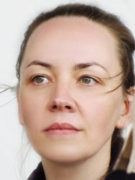Tights & Buttons
[translated poetry]
“Tights”
She likes the taste of her knee. In the summer, she’ll eat it straight from the skin. In the winter, she’ll do so until all the cotton hair has shed on her tongue. In her head stuck on the knee, the child puts together the things she knows.
An ant rubbed between fingers smells of vinegar. A butterfly has powder. A mole has a tailcoat. You can roll gray dirt on your skin. Old people smell of beetroot soup. There’s butter under your fingernails where splinters get in. People can be hunchbacked and crazy but not dogs or birds. When sucking on the salty knee, the child knows: the only thing that separates human from the world is the skin. It prevents you from soaking into the immensity of things.
“Buttons”
Grandma keeps her mother in a room with half a door. (She chopped the other half off to see what the old one is up to. She kept the remaining half locked.)
Grandma turns the key, then slides it behind her bra. She won’t give it to anyone. They might let that plague out into the rest of the house.
Last week she lost sight of her for one moment: great-grandma slashed the curtains and put a bag of sugar in the fire. She thought it was coal—both hard. She gutted the closet: she was looking for her uniform because she was going to school. She’s ninety years old, she doesn’t remember her own name but she certainly remembers the school uniform with the cross back. If you don’t lock her up, she’ll turn everything upside down.
“You seem a little too quiet there, Mommy,” grandma calls to the doorframe.
“I shit myself,” a head springs above the thick line of the chopped-off door.
“You’ll have to wait, then.”
Grandma will not drop her work. She won’t burn the meat. When you live under the same roof as madness, everything else must be normal. A good meal is part of that everything else.
A sweater lands in the kitchen. It’s followed by a skirt, a slip, and a bra.
“Excuse me, ma’am, can you call my daughter for me? Because I’m standing here naked.”
“I’ll be right there. I’m your daughter.”
“That’s not true. My daughter has dark hair and is slim like a stalk. Like that,” two fingers appear above the door, grabbing a half-inch of air in pincers. “You’re gray and fat.”
Grandma is changing her mother’s diaper. Velcro closures crunch on her hips.
“I’ll die if you pay me well,” says the old infant.
Grandma brings a bag of sheet buttons. She empties it on the floor.
“Enough?”
“How should I know? I need to count them.”
I’m sitting with great-grandma on the floor. We’re counting the buttons with our hands.
“Have you ever seen so much money?” she asks.
When she’s not looking, I put them in my shoes, I pop them down my shirt, I swallow them. Let there be fewer of them. Too few to die.
![]()
„Rajtuzy”
Lubi smak kolana. Latem wyjada go prosto ze skóry, zimą przez rajtuzy, aż wylinieje na język bawełniana sierść. W głowie zatkniętej na kolano dziecko układa rzeczy, które zna.
Mrówka roztarta w palcach pachnie octem. Motyl ma puder. Kret frak. Po skórze da się toczyć szare wałki brudu. Starych ludzi czuć barszczem. Za paznokciami jest masło, w które wchodzą drzazgi. Są garbaci i szaleni ludzie, ale nie psy i ptaki. Ssąc słone kolano, dziecko wie: jedyną rzeczą, która oddziela człowieka od świata, jest skóra. Dzięki niej nie wsiąka się w bezmiar rzeczy.
„Guziki”
Babka hoduje swoją matkę w pokoju z połową drzwi. Połowę urżnęła, żeby widzieć, co stara wyczynia. Połowę z zamkiem zostawiła. Przekręca w nim klucz, wrzuca za stanik. Nie da nikomu. Jeszcze by wypuścił tę plagę na dom.
W zeszłym tygodniu na moment spuściła ją z oka: prababka pocięła zasłony, wsadziła torbę cukru w ogień. Myślała, że węgiel – jedno i drugie twarde. Rozbebeszyła szafę: szukała fartuszka, bo idzie do szkoły. Ma dziewięćdziesiąt lat, nie pamięta własnego nazwiska, ale fartuch, co się zapinał na krzyż na plecach, owszem. Jak się jej nie zamknie, wywróci wszystko do góry nogami.
– Coś mi tam za cicho jesteś, mamusiu – woła babka do dziury w futrynie.
– Zesrałam się – nad krechę uciętych drzwi wyskakuje głowa.
– To poczekasz.
Babka nie rzuci roboty. Nie przypali mięsa. Kiedy ma się pod dachem wariactwo, reszta ma być normalna. Porządny obiad należy do reszty.
Do kuchni wpada sweter. Za nim lecą: spódnica, halka, stanik.
– Przepraszam, czy może pani zawołać moją córkę? Bo ja tu stoję goła.
– Zaraz przyjdę, jestem twoją córką.
– Nieprawda. Moja córka ma czarne włosy i jest szczupła jak łodyga. O, taka – nad drzwiami pokazują się palce, które biorą w kleszcze centymetr powietrza. – Ty jesteś siwa i tłusta.
Babka przewija swoją matkę. Rzepy pieluchy trzeszczą na biodrach.
– Umrę, jak mi dobrze zapłacisz – mówi stare niemowlę.
Babka przynosi worek pościelowych guzików. Wysypuje na podłogę.
– Wystarczy?
– Bo ja wiem? Muszę policzyć.
Siedzę z prababką na ziemi. Liczymy na palcach guziki.
– Widziałaś kiedyś tyle pieniędzy? – pyta.
Kiedy nie patrzy, wsadzam je do butów, wrzucam za koszulę, połykam. Niech będzie ich mniej. Za mało na śmierć.
Translator’s Statement:
It is hard to say whether the main characters in Bronka Nowicka’s prose poems are objects or people. If we consider what she wrote in her poem titled “Tights:” “the only thing that separates human from the world is the skin,” which “prevents you from soaking into the immensity of things,” we can conclude that, indeed, the border between the human world and the world of objects is constantly questioned in Nowicka’s writing, just the like the limits of the material and the immaterial. The universe in Nakarmić kamień is that of things the child desires to learn and experience through her senses. In addition, objects are essential in our lives because they preserve the memory of our loved ones.
Nowicka’s use of language in Nakarmić kamień is striking: words are combined in unusual configurations, producing condensed sentences which are yet full of imagery and symbolism. As a reader, I often found the beautifully odd images familiar, such as tasting one’s knee through the sheer membrane of tights, feeling the hands of dead people as if they were made of wax, listening to old people talk about the War. As a translator, I realized how challenging it would be (and was) to reproduce this dense cocktail of senses and symbols into English. One of the reasons for my struggle was the form of the pieces, that is, prose poetry. In his Introduction to the first volume of The Prose Poem: An International Journal, Peter Johnson defined the prose poem as a piece of writing that “plants one foot in prose, the other in poetry, both heels resting precariously on banana peels” (6). In a similar way, I found myself jumping constantly from one side to another: on the one hand, I was often tempted to add words such as “because” or “since” to allow for the sentences to flow, as if in prose. On the other hand, I did not want to interfere with the staccato rhythm of the sentences which read like individual lines of a poem. I think that this tension between prose and poetry is visible in Nowicka’s work, and I wanted to recreate this complicated marriage between the two forms of writing in my translations.
Johnson, Peter, editor. “Introduction.” The Prose Poem: An International Journal, vol. 1,
Providence, Providence College Press, 1992.
Nowicka, Bronka. Nakarmić kamień [Feeding the Stone]. Biuro Literackie, Stronie Śląskie,
Wrocław, 2015.

 Agnieszka Gabor da Silva graduated from the University of Massachusetts, Amherst, where she studied Lusophone literatures and cultures. Her Master’s thesis involved translating Clarice Lispector into Polish. She also holds a Master of Arts in English from Adam Mickiewicz University in Poznań, Poland. Her research interests include modernist and contemporary Brazilian literature, translation, and Luso-African literature. She is also committed to promoting Polish literature in the US and Brazil through translation.
Agnieszka Gabor da Silva graduated from the University of Massachusetts, Amherst, where she studied Lusophone literatures and cultures. Her Master’s thesis involved translating Clarice Lispector into Polish. She also holds a Master of Arts in English from Adam Mickiewicz University in Poznań, Poland. Her research interests include modernist and contemporary Brazilian literature, translation, and Luso-African literature. She is also committed to promoting Polish literature in the US and Brazil through translation. Bronka Nowicka was born in 1974. She is a film director, screenwriter, and poet. She graduated from the Polish National Film School in Łódź and the Academy of Fine Arts in Kraków. The fields of her inspiration, exploration, and creation include Intermedia, Language, Image in motion. In 2016, she received the Nike Literary Award, one of the most prestigious awards for Polish literature, for her prose poetry volume titled Nakarmić kamień [Feeding the Stone, published by Biuro Literackie, 2015].
Bronka Nowicka was born in 1974. She is a film director, screenwriter, and poet. She graduated from the Polish National Film School in Łódź and the Academy of Fine Arts in Kraków. The fields of her inspiration, exploration, and creation include Intermedia, Language, Image in motion. In 2016, she received the Nike Literary Award, one of the most prestigious awards for Polish literature, for her prose poetry volume titled Nakarmić kamień [Feeding the Stone, published by Biuro Literackie, 2015].


